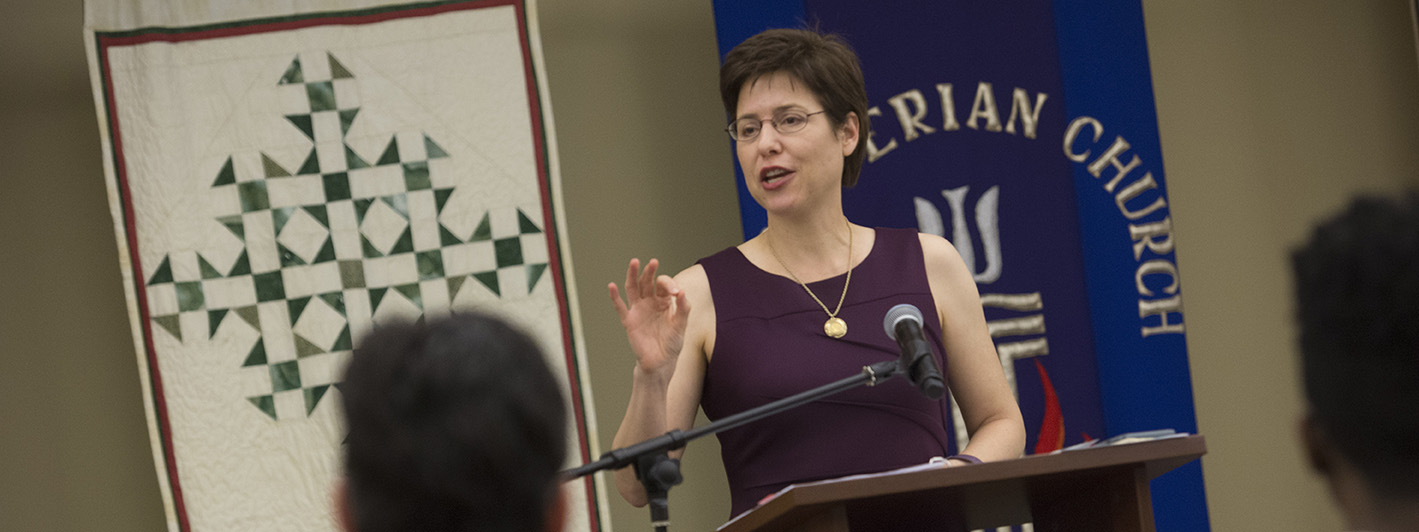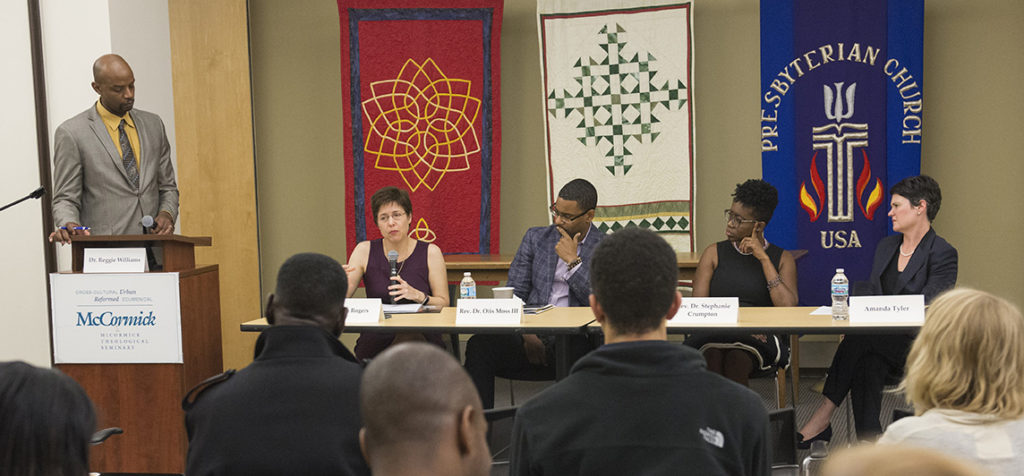
Melissa Rogers and other leaders speak on how people of faith can be the conscience of the state
By Cherilyn Crowe
Religious communities can hold political officials accountable to principles that are at the heart of civic and constitutional traditions, according to Melissa Rogers, the former head of the White House’s faith-based office.
“But, religion must be, in meaningful ways, independent of the state,” she said, noting that such an independence lets religion be authentic and vital, allowing religious communities to call our nation to be its best.
Rogers delivered a powerful account of faith being transformed into action at a special Baptist Joint Committee Symposium on October 26. Held on the campus of McCormick Theological Seminary in Chicago, “Faith-Based Activism and Service in American Public Life” included a lecture from Rogers and a panel discussion with leaders from Chicago and Washington, D.C.
Currently a nonresident senior fellow in governance studies at The Brookings Institution, Rogers recently served as special assistant to the president and executive director of the White House Office of Faith-based and Neighborhood Partnerships during the Obama administration. Previously, Rogers served as chair of the inaugural Advisory Council on Faith-Based and Neighborhood Partnerships. Prior to that, Rogers was director of the Center for Religion and Public Affairs at Wake Forest University Divinity School. She has also served as executive director of the Pew Forum on Religion and Public Life and general counsel of the Baptist Joint Committee.
Rogers’ address focused on how the United States’ laws and traditions ensure religion’s independence from government, and she offered a few examples of how religious communities are using their independence today to serve as the conscience of the state.
She reviewed the three basic ways the Constitution separates the state from religion: prohibiting religious tests for public office in Article VI, barring the government from establishing religion — any religion — in the First Amendment’s Establishment Clause, and protecting the free exercise of faith in the First Amendment’s Free Exercise Clause.
“The Constitution’s protections are essential for creating a context where religious communities are meaningfully independent from the state,” she said. But, those protections are not sufficient by themselves to create that independence.
“[A]ll the freedom and protections that are offered by our Constitution can’t ensure a religious community’s independence if it gets in its own way,” she said, offering examples of harm done when a religious group serves as a “lap dog” of a political party, faction or tribe.
Tribalism is as simple as a leader or group faulting someone outside the faction for certain behavior, yet giving someone inside their favored faction a pass for the exact same behavior.
“When Christians engage in these and other forms of tribalism, we do incalculable damage to our witness,” she said. “This is a danger that really all religious groups, I believe, have to be constantly aware of.”
Rogers offered examples of her time in the White House when religious communities of all stripes sometimes held their feet to the fire. “[I]t always made us think,” she said, “and sometimes it made us change our minds.”
“It also reminded us that our government is limited, that there are checks and balances — both formal and informal — for a reason, and that all of these things work together to make our country truly great,” she recounted.
“In short, religious communities must apply their standards consistently across administrations and across tribal or partisan lines. When religious communities act in this way, they are independent. And when they are independent, they are credible. And when they are credible, they have influence, including on our nation’s public life.”
That influence can be used, she said, to promote justice and freedom for all; to extend mercy to those who suffer; to stand in solidarity with the marginalized; and to bear one another’s burdens and bind up wounds.
She also elaborated on how the Establishment Clause protects the integrity of majority faiths. A government establishment of religion not only harms non-religious people and minority faiths, she noted, but it also harms the faith that the state backs, as it picks and chooses among elements of the faith it finds helpful to the government’s agenda.
“This warps faith,” Rogers said. “It makes religion a creature of the state, and thus robs it of its prophetic power.”
Following her lecture, Rogers participated in a panel discussion to explore the topic further. Moderated by Dr. Reggie Williams, professor of Christian ethics at McCormick, the conversation included the Rev. Dr. Otis Moss III, pastor of Chicago’s Trinity United Church of Christ; the Rev. Dr. Stephanie M. Crumpton, professor of practical theology at McCormick; and BJC Executive Director Amanda Tyler.
 Panelists discussed activism and current issues facing people of faith. They also explored the importance of bringing a specific faith perspective when advocating for a cause and adding something unique to the conversation.
Panelists discussed activism and current issues facing people of faith. They also explored the importance of bringing a specific faith perspective when advocating for a cause and adding something unique to the conversation.
Crumpton said that distinction is bringing “a presence to the table that speaks up for life in the name of God for all and all it takes to sustain life.” Faith-based activists recognize and call for humanity, she said, because we believe God created all — not just those who can bring a certain benefit to the table or fit a certain mold.
Faith-based activism is not only direct action and a prophetic voice, but it has a very distinct flavor, said Moss, in the words we use and the issues we bring to the forefront. He said it is a way of expressing moral agency in civic discourse, “forcing society to face the blues that people in power created” and demanding that they join in finding solutions.
“It’s really putting your feet and your mouth where your heart is,” said Tyler, who discussed the importance of speaking to amplify the voices of those who don’t always have a seat at the table.
Rogers pointed out the impact of the faith community’s advocacy for others during her time in the White House. “I have been in meetings seeing government officials recognize that a person is there not for anything they’re going to get out of it, but because they feel called to speak to protect those who are vulnerable,” she shared. “And it pierces the noise, and it matters. It makes a huge difference.”
The panelists also talked about the importance of recognizing dissent and making sure we do not demonize the other side. “The commitment is to recognizing humanity and calling for humanity,” Crumpton said. “We can be in a moment of deep discord and disagreement, but our commitment, however, is to remind each other that we do not have to devolve into dehumanization.”
Moss used a sports analogy to point out the difference in engagement. Playing a sport is markedly different from watching it on television, he said. In a spectator model, when someone isn’t playing, one can take on a fundamental hate for the “other” because he or she is not invested in the game. “All they do is sit in the stands and cheer for the hurt and harm of the person they’ve decided to hate. We see that today, rhetorically and politically,” he said.
The results of activism are not as measurable as one might think, according to the panel. Rogers said the faith-based activist’s job is not to necessarily win at any cost, but to bear witness all the time.
Tyler reminded the crowd that activism is not just limited to issues on the national stage. Some people disengage when they feel issues are so big that they cannot make an impact. She encouraged everyone to think about activism outside of Washington, including at the local level. “There is activism to be done in our communities in a way that you can bear witness and maybe see more of the positive impact you can have on the local level.”
“When the laws of the land are not in alignment of what we understand to be human rights, then we act to address it by faith,” Williams said in summing up the conversation.
The BJC Symposium on Faith-Based Activism and Service in American Public Life is the third in a series of events sponsored by the Baptist Joint Committee to increase its demographic reach, bringing religious liberty discussions and the BJC to diverse communities.
This article appeared in the November/December 2017 edition of Report from the Capital. You can also read the digital version of the magazine or view it as a PDF.




